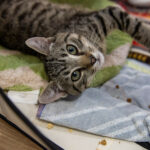 Cats tolerate so much that they cannot understand.
Cats tolerate so much that they cannot understand.
They put up with our insistence upon pants, superfluous expenditures better directed to dairy.
They do not give us a hard time for having meetings when we could be laying on the floor.
They respect our mysterious need to watch strangers throw balls into hoops and nets.
They do this because they love us. But even lovers get exasperated.
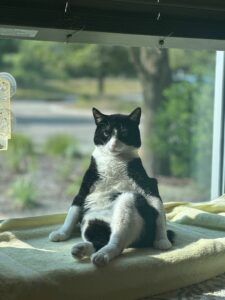
If there is one human foible cats cannot accept, it is self-pity.
In its lesser forms, self-pity embarrasses them. Gulliver will look away respectfully if you grumble about your hangnail. He will not remind you that there was a time when his own bones were not on speaking terms with each other, and his own surgeon did not expect him to survive.
He will not remind you, because he does not remember, which is a choice.
But it is the really gaudy self-pity that gets cats’ goat. (They would negotiate about this if you were to get them goat parmigiana, but that is another story.)
If you would like to confuse Maurice, tell him that you are a suffering, starving, tortured artist. He will stick his head under his microchip-activated feeder so you can get a bite to eat. He will declare that his best art comes from the intersection of happiness and egomania.
Then, he will go back to his happiness and egomania, because misery is boring.
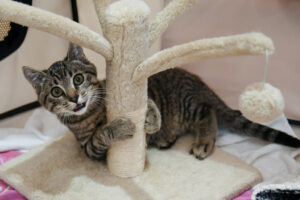
This is why Stewart was not boring.
Stewart is an electric snickerdoodle with a comedy club inside his brain. Stewart is unable to walk, run, or dance without falling down repeatedly.
Stewart does not remember the falling, only the rising.
Not even the world’s finest neurologist could determine what was wrong with Stewart. Stewart was not sure what we meant by “wrong.” Stewart was not, and is not, suffering.
Stewart has suffered. Stewart suffered rejection from Prescott, despite his repeated offers of marriage. Stewart suffered the wait between dinner and after-dinner dinner.
But Stewart could not be found in the suffering. Stewart was in the rising.
Despite being a teenager, Stewart has the emotional intelligence of the greatest grandpa. Stewart wants to know who you are. Stewart’s eyes are large enough to welcome all your shy dreams and contradictions.
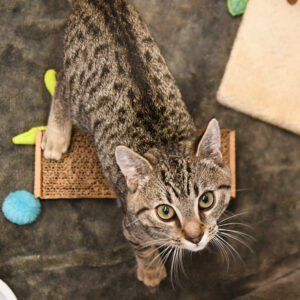
But Stewart’s eyes will water if you introduce yourself by your pain.
To Stewart, a delayed breakfast or a pratfall is a mere pencil mark. The next moment’s magic will wash it clean.
But small animals like humans insist it is a tattoo. I am still whining about the crunching sound my feelings made when they were hurt in ninth grade. You are still writing poems about the belligerent bunion of 2004.
We cherish our pain. We gather it into our lap, pet it, and dress it in little hats. We want everyone to know that we have suffered.
The cats want everyone to know that there is something after suffering.
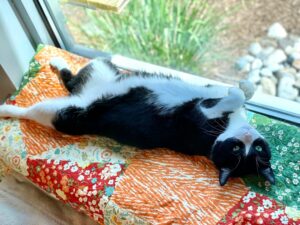
I do not mean to diminish any of our pain. We must be tender with ourselves and one another. We must tell our stories as many times as necessary. We must become sanctuaries for each other, the way Stewart is for us.
But we must not introduce ourselves by the wrong name.
Stewart is not Neurological Disease. Gulliver is not Hit By A Car.
Pain comes. Pain goes. Pain is the least interesting part of the day. Pain is even less interesting than pants, which is saying a lot.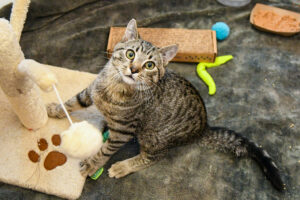
And pain meets its match in the sanctuary.
We all have pterodactyls in our past and dragons in our future. But here we are, together, in the most interesting moment in history.
The cats are listening.
PS: Stewart is listening from afar … because Stewart was adopted by one of our dearest and best volunteers.
